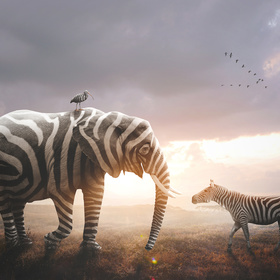
Animal Classification Challenge
The objective of this challenge is to create a machine learning model to accurately predict the likelihood that an image contains a zebra, as opposed to an elephant. While this may be an easy task for humans, elephants, and zebras, your computer will find it a bit more difficult.
The total dataset contains 18,000+ images of zebras and elephants, sampled from the Snapshot Serengeti collection of more than 6 million animals. The data was retrieved from the Data Repository for the University of Minnesota, https://doi.org/10.13020/D6T11K, under a creative commons license, from a study titled: Camera Trap Images used in "Identifying Animal Species in Camera Trap Images using Deep Learning and Citizen Science".*
“Hundreds of camera traps in Serengeti National Park, Tanzania, are providing a powerful new window into the dynamics of Africa’s most elusive wildlife species. We need your help to classify all the different animals caught in millions of camera trap images. This grid of camera traps has been operating continuously since 2010 and has produced millions of images, which our amazing volunteers classified!” For more info on the Snapshot Serengeti, please visit: https://www.snapshotserengeti.org/
This challenge is being hosted in association with Standard Bank.
About the Standard Bank Tech Impact Challenge

The Standard Bank Tech Impact Challenge (SBTIC) is a competition for teams of students in South African tertiary institutions, at undergraduate and honours level, to demonstrate their programming ability and teamwork capabilities with limited resources.
Each of the participating tertiary institutions enters a number of teams. The teams attempt to solve as many problems as possible during the Heats, which take place at the tertiary institutions during the first half of the year. The top teams from the the top 15 institutions are then invited to the Finals in Johannesburg. The winning student teams and tertiary institutions receive prizes as outlined in the SBTIC rules and terms and conditions.
In 2019, the theme of the SBTIC is Machine Learning and Artificial Intelligence and the winners will be awarded and recognised for show-casing their engineering excellence, creativity and innovation.
For more information, please visit the Standard Bank Tech Impact Challenge Website.
* Full citation: Willi, Marco; Pitman, Ross T; Cardoso, Anabelle W; Locke, Christina; Swanson, Alexandra; Boyer, Amy; Veldthuis, Marten; Fortson, Lucy. (2018). Camera Trap Images used in "Identifying Animal Species in Camera Trap Images using Deep Learning and Citizen Science". Retrieved from the Data Repository for the University of Minnesota,
The evaluation metric for this challenge is the Area Under the Curve.
Your submission file should look like:
id label ASG001dw7n_1.jpeg 1 ASG001dw7q_2.jpeg 0 ASG001dw7s_1.jpeg 0
This is a learning competition. Aside from knowledge, there are no prizes for this competition.
You will receive 25 points for your first submission and 50 points for your first non-sample submission. You can read more about Zindi points here.
As this is a knowledge competition it will not close.
We reserve the right to update the contest timeline if necessary.
🚀 What to know to get started with Zindi Challenges
How to get started on Zindi
How to create a team on Zindi
How to run notebooks in Colab
How to update your profile
As this is a learning challenge, aside from the rules in the Terms of Use, no other particular rules apply.
This challenge is open to all and not restricted to any country.
Teams and collaboration
You may participate in this competition as an individual or in a team of up to four people. When creating a team, the team must have a total submission count less than or equal to the maximum allowable submissions as of the formation date. A team will be allowed the maximum number of submissions for the competition, minus the highest number of submissions among team members at team formation.
Multiple accounts per user are not permitted, and neither is collaboration or membership across multiple teams. Individuals and their submissions originating from multiple accounts will be disqualified.
Code must not be shared privately outside of a team. Any code that is shared, must be made available to all competition participants through the platform. (i.e. on the discussion boards).
Datasets and packages
The solution must use publicly-available, open-source packages only. Your models should not use any of the metadata provided.
You may use only the datasets provided for this competition. Automated machine learning tools such as automl are not permitted.
If the challenge is a computer vision challenge, image metadata (Image size, aspect ratio, pixel count, etc) may not be used in your submission.
You may use pretrained models as long as they are openly available to everyone.
The data used in this competition is the sole property of Zindi and the competition host. You may not transmit, duplicate, publish, redistribute or otherwise provide or make available any competition data to any party not participating in the Competition (this includes uploading the data to any public site such as Kaggle or GitHub). You may upload, store and work with the data on any cloud platform such as Google Colab, AWS or similar, as long as 1) the data remains private and 2) doing so does not contravene Zindi’s rules of use.
You must notify Zindi immediately upon learning of any unauthorised transmission of or unauthorised access to the competition data, and work with Zindi to rectify any unauthorised transmission or access.
Your solution must not infringe the rights of any third party.
Submissions and winning
You may make a maximum of 10 submissions per day.
Note that to count, your submission must first pass processing. If your submission fails during the processing step, it will not be counted and not receive a score; nor will it count against your daily submission limit. If you encounter problems with your submission file, your best course of action is to ask for advice on the Competition’s discussion forum.
Note that there is no public/private leaderboard split for this challenge. Read more about public and private leaderboards in this post.
You acknowledge and agree that Zindi may, without any obligation to do so, remove or disqualify an individual, team, or account if Zindi believes that such individual, team, or account is in violation of these rules. Entry into this competition constitutes your acceptance of these official competition rules.
Zindi also reserves the right to disqualify you and/or your submissions from any competition if we believe that you violated the rules or violated the spirit of the competition or the platform in any other way. The disqualifications are irrespective of your position on the leaderboard and completely at the discretion of Zindi.
Please refer to the FAQs and Terms of Use for additional rules that may apply to this competition. We reserve the right to update these rules at any time.
Join the largest network for
data scientists and AI builders